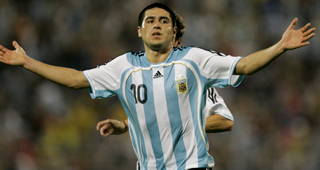Maybe it was the slumped shoulders, or the quizzical expressions. For all of Juan Roman Riquelme’s sublime moments, there was a lingering cynicism about him. So in the biggest moment of his career, in the second leg of the 2006 Champions League semi final against Arsenal, he stepped up to take a penalty kick in the 90th minute, down 1-0 on aggregate, did you think he would rise to the occasion? Or did you know he would miss?
For us who came of soccer age with the mid 2000s Champions League, we know what happened next. He missed the poorly placed penalty, and Arsenal went through to the final. With that, he could withdraw back to his folk hero status, the unquestioned big fish in Villarreal’s small, yellow pond. It was far away from the responsibility of winning international tournaments.
Which is why Riquelme was at Villarreal in the first place, sent on loan from Barcelona. Barcelona, had Xavi, their own genius passer. Except Xavi would shape himself for the side, and especially important at Barcelona, for the tiki taka ideal. His sacrifice led to the most dominant four-year period of any club side in soccer history, as Barcelona won 14 trophies during that span. Xavi could no doubt take charge of the 20 pass movements that lead to goals. But he also married it with the pragmatism necessary in the modern game to turn passing into titles.
Riquelme, on the other hand, never compromised on the latter. Former Argentine striker Jorge Valdano remarked that it was “impossible to have him in the team without giving him all the responsibility.” And when he didn’t get his way, like when Maradona wanted him to play further up the field for the national team, he simply quit.
-----------------------------
There were reasons why Manuel Pellegrini and Jose Pekerman acquiesced to Riquelme in the first place. Sides built around him were patient, probing, and always in control. It was soccer played at a long crescendo.
For a span of two seasons from 2005-07, he got his wish, and both club and national team were molded around him. Two months after missing the penalty against Arsenal, Riquelme led Argentina into the 2006 World Cup in Germany.
It was here where Riquelme found his nirvana, with this 26 pass goal against Serbia. No Argentine player touched the ball more than three times per possession. The move began with Riquelme receiving an outlet after a Serbia turn over. A player today would have perhaps began dribbling immediately towards opposition goal, hoping to catch the defender out of position. But the tempo was Riquelme’s, killing the ball as if allergic to counter attacks, and playing it backwards - all while walking. It was his way, or no way.
Argentina would end up losing to Germany in the quarterfinals on penalties. This time, it was Pekerman who lost his nerve, substituting Riquelme for the pragmatic Cambiasso in the 72nd minute, and using Julio Cruz instead of Messi.
The following summer, Riquelme led Argentina in the Copa America under Alfio Basile. Again, the side dazzled, scoring 16 goals on their way to the final, with Riquelme again reaching one touch transcendence.
This time, Argentina lost in the finals to a more physical, direct, counter attacking Brazil. The 3-0 result was much more emphatic than the loss to Germany, and portended the shortcomings of a side led Riquelme. Brazil, under Dunga, didn’t have the players, or desire, to string together passes. But they could defend, then hit quick 40 yard diagonals to put attackers in 1 on 1 situations near goal.
The year after, Riquelme got into his squabble with Maradona, left Europe for Boca Juniors. That was the last significant impact he’d make internationally for the senior side.
When Riquelme retired, the eulogies came in one by one. The affection was appropriate for a player who delivered some of the highest moments in the past decade. But the underlying, bittersweet theme was that we may never see another player of Riquelme’s ilk again. As Tim Vickery notes, soccer today is so much “how” instead of “what” (and contrast the tone of Vickery’s piece with Sid Lowe’s piece earlier for how time changes perception).
It’s impossible to imagine Riquelme closing down opposition center backs for Atlético Madrid or Dortmund, or Riquelme plodding along at some hybrid attacking midfielder/striker role at Bayern. Playmakers on an international level have fundamentally changed.
Isco the best young #10 in the world, is pushed to the left, and gets into a Real Madrid side for his defensive work balancing the midfield as much as his dribbling or passing. The tempo and the killer pass are dictated by a consensus mind of him, Luka Modric and Toni Kroos. Alexis Sánchez, Luis Suárez, and Messi start wide, using a combination of trickery, speed, and dribbling to create openings. Width, transitions, pressing - playmaking in the modern game relies more on concepts than an any individual. And that’s without discussing how teams are as adept at controlling the tempo without the ball as one Riquelme was with the ball at his feet. 2015 is no country for old #10’s.
His playmaking peers, Zidane, Xavi and Totti, each found a middle ground between their vision and team pragmatism, and were rewarded by winning a World Cup. On talent alone, Riquelme should have been here. But having never won an international trophy at the senior level, or achieved sustained Champions League success, the two barometers for present day soccer immortality, the history books may not be so kind to Riquelme.
All we have left is the 26 pass sequences and a handful of grainy nutmegs. Viewed in 8 minute spurts in YouTube compilations, Riquelme’s skill and imagination is as unique as any player, toying with opponents at the highest levels. It was the rest of the time, when he didn’t have the ball, that prevented him from much, much more.



